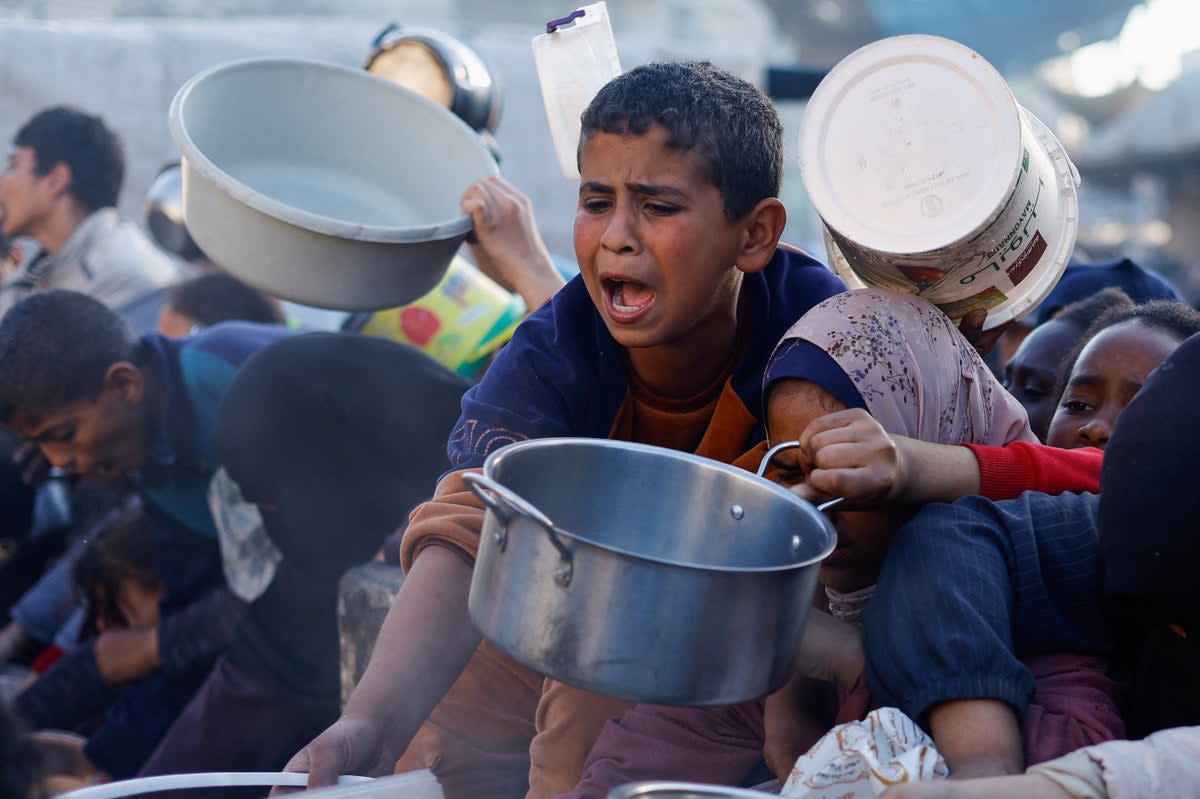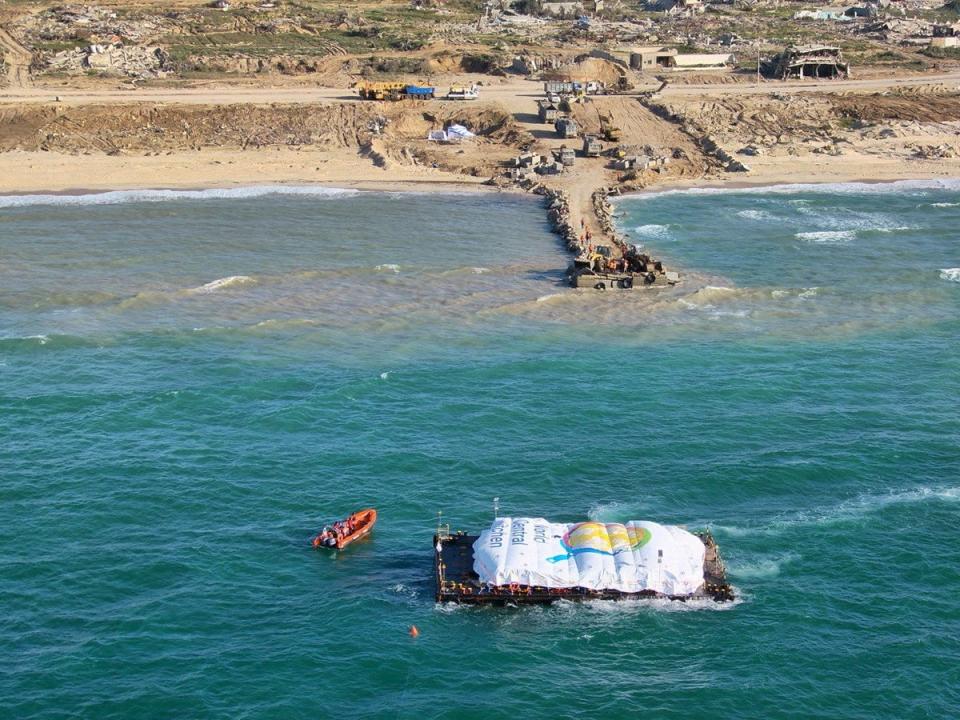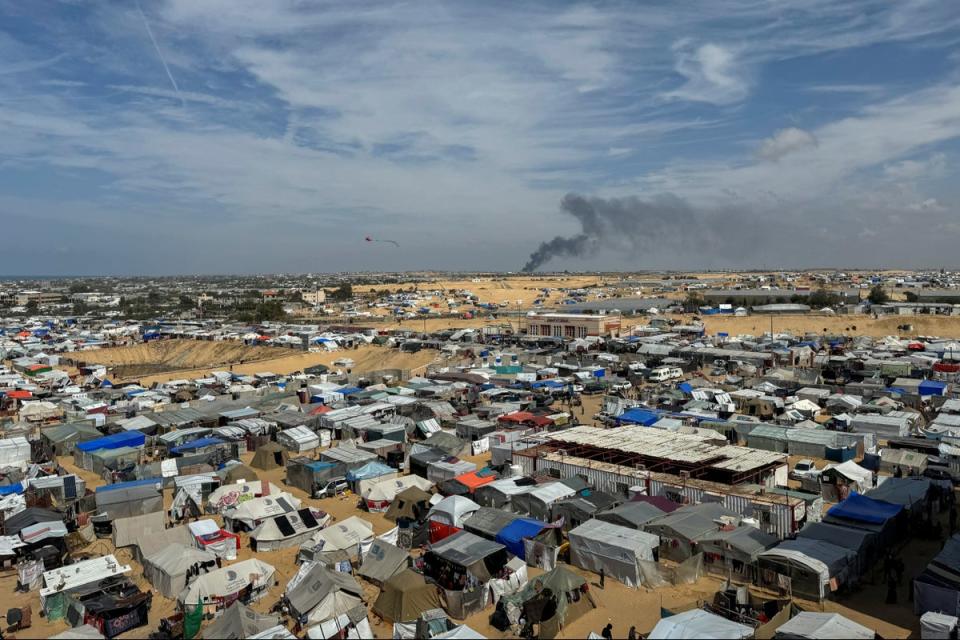Netanyahu approves plans for Rafah assault – as aid ship reaches Gaza along new sea route

Benjamin Netanyahu has approved plans for an Israeli military assault on Rafah in the southern Gaza Strip, where more than 1 million Palestinians are sheltering with nowhere else to turn.
It comes as a ship towing a barge carrying 200 tonnes of food arrived off the coast of Gaza on Friday in a test run for a new sea aid route from Cyprus. The UN, EU and aid agencies have all warned of looming widespread famine in Gaza more than five months into Israel‘s war against Hamas, which has included aerial bombardment, ground operations and a blockade.
“Prime minister Netanyahu has approved the plans for action in Rafah. The IDF [Israel Defence Force] is preparing operationally and for the evacuation of the population,” a statement from his office said.
The US, UK and a number of other nations have repeatedly warned Mr Netanyahu against a military operation in Rafah, where more than half of Gaza’s 2.3 million population currently resides. Most people fleeing Israel’s military operations have moved southwards, often on the advice of the IDF.
The UN and aid agencies have warned of an even greater humanitarian disaster if Israeli forces head into Rafah, with residents having no option but to head back north if they want to flee. There are fears of significant civilian casualties if the city is attacked.

In the wake of the Israeli statement, the US secretary of state, Antony Blinken, said that Washington needs to see a clear and implementable plan for a military operation in Rafah, including to get civilians out of harm’s way. “We’ve not yet seen such a plan,” Mr Blinken said. Joe Biden has called an attack on Rafah a “red line” if undertaken without provisions to protect civilians.
On Thursday the Israeli army said it planned to move displaced Palestinians in Gaza to what it called “humanitarian islands” in the middle of the strip, without offering any details on how they would operate. No timeframe has been put on the Rafah military operation.
The Rafah decision came after an urgent meeting of Israel’s war cabinet called to discuss a new proposal from Hamas for a ceasefire.
The Hamas ceasefire proposal is said to call for a three-stage process, starting with a partial Israeli pullback in Gaza and the release of dozens of Palestinian detainees, most held without charge, in exchange for the release of all the female hostages that the militants are still holding, according to a number of reports. It also calls for talks in a later stage on ending the war.

Mr Netanyahu called the demands “unrealistic” but said that an Israeli delegation would join international mediators in Doha for another round of talks. Some analysts have suggested that the announcement about Rafah could be aimed at putting pressure on Hamas during talks.
The Israeli invasion of Gaza came after an attack by Hamas on 7 October inside southern Israel during which around 1,100 people were killed and another 250 taken hostage. Palestinian health officials in the Hamas-run strip say that more than 31,000 Palestinians have been killed in Israel’s military operations.
When it comes to aid, the US charity behind the ship mission from Cyprus, World Central Kitchen, said two crates had been delivered to shore from the barge by Friday afternoon. A number of nations have called on Israel to open more land crossings into Gaza, which is the most effective way of getting aid into the besieged territory.
The aid ship could be spotted from the coast hours after the Palestinian Health Ministry in Gaza accused Israeli forces of launching an attack near an aid distribution point in northern Gaza, killing 20 people and wounding 155 others.
The Israeli military said in a statement that Palestinian gunmen were the ones to open fire and that none of its forces, who were securing a convoy of 31 aid trucks, fired towards the waiting crowd or the convoy.
Associated Press and Reuters contributed to this report

 Yahoo News
Yahoo News 
